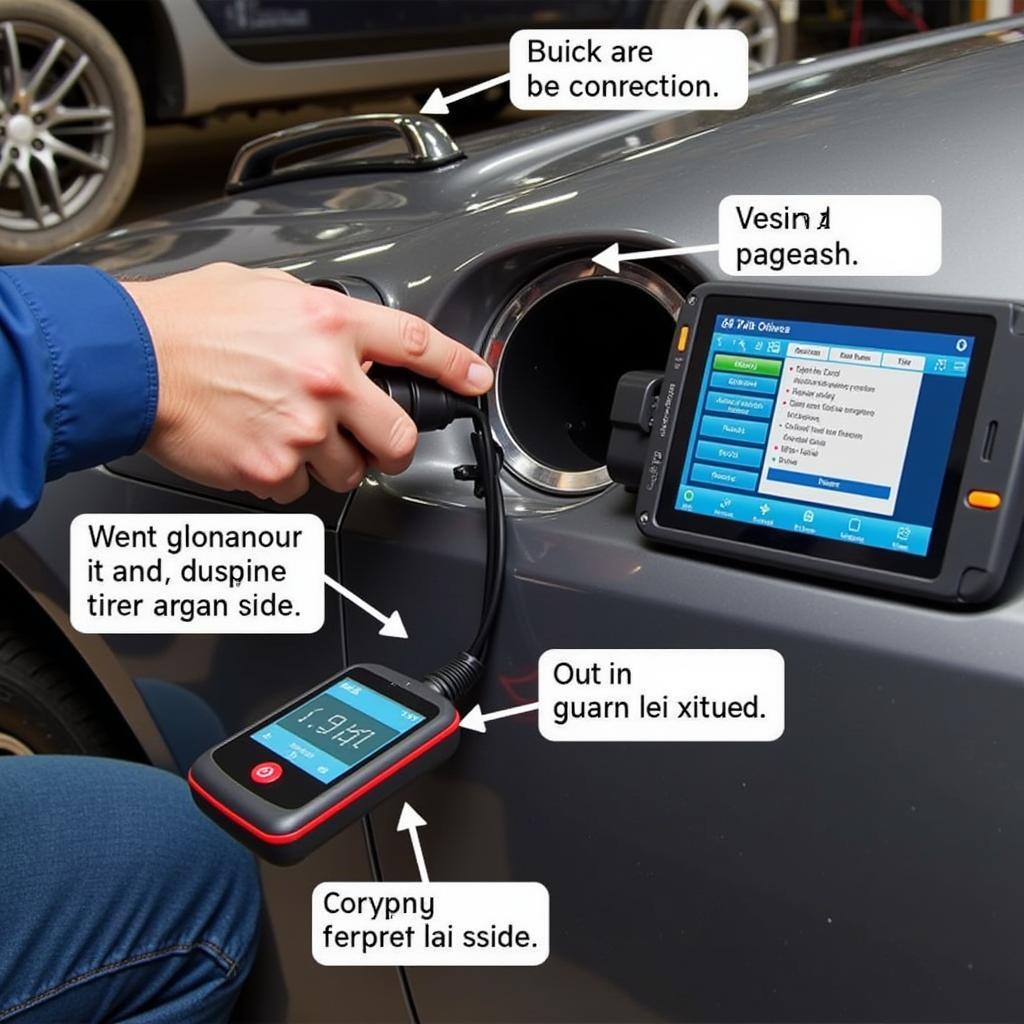Modern vehicles rely heavily on sophisticated electronic control systems, commonly known as Automotive Control Systems (ACS). These systems manage everything from engine performance and fuel efficiency to safety features and comfort controls. When problems arise within these intricate networks, pinpointing the root cause requires specialized Diagnostic Tools For Acs. This article delves into the importance of these tools, exploring their various types, functionalities, and how they empower both professional mechanics and DIY enthusiasts to effectively troubleshoot and resolve automotive issues.
Understanding the complexities of modern ACS requires acknowledging the sheer volume of data these systems process. From sensor readings to actuator commands, a constant stream of information flows through the vehicle’s electronic network. Without the proper diagnostic tools for ACS, deciphering this data would be like trying to read a foreign language. These tools act as translators, converting complex code and data streams into understandable information, allowing technicians to diagnose and repair issues efficiently.
Types of Diagnostic Tools for ACS
Several types of diagnostic tools are available, each offering different levels of functionality and catering to varying user needs. Basic code readers provide access to Diagnostic Trouble Codes (DTCs), which are stored in the vehicle’s computer and indicate potential issues. More advanced scan tools offer live data streaming, allowing technicians to monitor sensor readings in real-time and pinpoint malfunctions. Oscilloscope and multimeters are invaluable for diagnosing electrical issues, while pressure gauges and vacuum testers are essential for diagnosing mechanical problems related to the ACS.
For those looking to delve deeper into network diagnostics on their Apple devices, tools like those mentioned in network diagnostic tools mac os x can be surprisingly helpful in understanding network principles that also apply to automotive systems. The ability to analyze data packets and network traffic on a computer can offer valuable insights into similar processes within a vehicle’s network.
Choosing the Right Diagnostic Tool for Your Needs
Selecting the appropriate diagnostic tools for ACS depends on several factors, including your level of expertise, the types of vehicles you work on, and your budget. For DIY enthusiasts, a basic code reader or an OBD-II scanner may suffice for simple diagnostics and troubleshooting. Professional mechanics, on the other hand, require more advanced tools like high-end scan tools with bi-directional control, oscilloscope capabilities, and access to manufacturer-specific data.
Another resource for those using Apple products, similar to the iphone diagnostic tool mac, can offer valuable lessons in how diagnostic software interfaces with hardware. While the applications are different, the underlying principles of data retrieval and analysis remain the same.
 Selecting the Appropriate Diagnostic Tool for Your Needs
Selecting the Appropriate Diagnostic Tool for Your Needs
What are the benefits of using diagnostic tools for ACS?
Using diagnostic tools for ACS offers numerous benefits, including faster and more accurate diagnostics, reduced repair time, and the ability to identify intermittent problems that might otherwise be missed. These tools also empower technicians to perform preventative maintenance by identifying potential issues before they become major problems.
How can diagnostic tools for ACS improve my workflow?
Diagnostic tools for ACS streamline the diagnostic process by providing quick access to vital data, allowing technicians to focus on the repair rather than spending time searching for the root cause. This efficiency translates to increased productivity and improved customer satisfaction.
“Accurate diagnosis is the cornerstone of efficient auto repair,” says automotive expert John Miller, ASE Certified Master Technician. “Diagnostic tools for ACS are no longer a luxury, but a necessity for anyone working on modern vehicles.”
Staying Updated with Advancements in Diagnostic Technology
The automotive industry is constantly evolving, with new technologies and systems emerging regularly. Staying current with these advancements is crucial for effective diagnostics and repair. Continuously updating your knowledge and investing in the latest diagnostic tools for ACS will ensure you are equipped to handle the challenges of modern vehicle repair. Resources like the medical diagnosis technology 5 diagnostic tools related to communication can provide insight into how different fields leverage technology for diagnostics, highlighting the importance of effective communication between the tool and the user.
“Investing in quality diagnostic tools is an investment in your future as an automotive technician,” adds Sarah Johnson, Lead Engineer at a leading automotive technology company. “The ability to quickly and accurately diagnose complex issues is essential for success in today’s competitive market.”
 Staying Updated with Advancements in Diagnostic Technology
Staying Updated with Advancements in Diagnostic Technology
In conclusion, diagnostic tools for ACS are indispensable for anyone working on modern vehicles. These tools empower technicians and DIY enthusiasts to quickly and accurately diagnose complex issues, saving time and money. By investing in the right tools and staying updated with the latest advancements, you can ensure you are well-equipped to handle the challenges of modern auto repair. For further assistance and guidance on selecting the best diagnostic tools for your needs, connect with the experts at ScanToolUS at +1 (641) 206-8880 or visit our office at 1615 S Laramie Ave, Cicero, IL 60804, USA. We are dedicated to providing top-notch diagnostic solutions for all your automotive needs.
Do you have any further questions or require assistance? Please contact us! We’re here to help!

